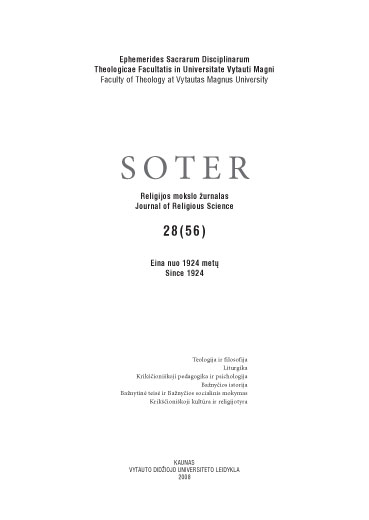Kontracepcija: latentinė mirties kultūros filosofijos raiška
CONTRACEPTION: THE LATENT EXPRESSION OF PHILOSOPHY OF CULTURE OF DEATH
Author(s): Eugenijus DanilevičiusSubject(s): Christian Theology and Religion
Published by: Vytauto Didžiojo Universitetas
Keywords: kontraceptinių priemonių naudojimas; latentinis kontracepcijos naudojimo poveikio pobūdis; mirties kultūros filosofja; gyvybės kultūra,the contraception; the latent character of the impact of using of contraception; philosophy of culture of death ...
Summary/Abstract: The object of the research is the use of the contraception. The aim of the article is to reveal the correlation between contraception and philosophy of death culture. The article presents the moral evaluation of contraception, introduces the main postulates of death culture, discloses the latent character of the impact of using contraception and draws the problem tree of using contraception. The main conclusion of the research is given at the end of the article. The genesis of contraception comes from death culture in post-modern society. The contraception is related with crisis of personal faith, the disorientation of values and misshapen atheistic world outlook. From the moral point of view, contraception is forbidden. It is directed against life and love, denying openness to life and neglects marital love. Contraception reduces conjugal chastity and outrages the fifth and sixth commandments of God. Death culture has two anthropological roots: exceeded subjectivity and autonomy of a person with his strong individualism and full freedom on the one hand, and total dependence on the other hand. The first root is most relevant to the relationship of contraception with death culture. The natural family planning, even with its serious reasons to avoid pregnancy, is the key point of life culture and civilization of love precisely because the concept of a human person and human sexuality rests upon solid anthropological and moral bases. I would like to look briefly at these bases and at the concept of human person and of human sexuality from the point of view of periodic continence. The anthropology is holistic, i.e., it regards a human person as a unity of body and soul. As a unity of body and soul, a person is a subject to moral actions. According to anthropology, body with its carnal life is an integral part of a person. Offering their bodies to each other, a man and a woman express a sign, a sacrament, and communion of persons. Body becomes a means and sign of the gift given by a man and a woman. Pope John Paul II calls this capacity of the body to express the communion of persons – the nuptial meaning of the body. Contraception leads to abortion, because of these reasons: 1) the promotion to promiscuity; 2) the formation of anti-life-mentality that denies the natural connection between sexual intercourse and babies: a child is seen as a threat; fertility is treated like sickness; 3) abortifacients (the morning-after pill is an abortifacient). Contraception leads to divorces, because of these reasons: 1) having many partners before marriage; 2) adultery in marriage; 3) decreasing the number of the children in family; 4) living together before marriage. Two aspects of contraception as distortion of love: 1) contraception contradicts to the full self-giving and violates the unity between the language of body and thought. In body language, the marital act means absolute self-donation and acceptance of the other, but the act of using contrac
Journal: SOTER: religijos mokslo žurnalas
- Issue Year: 56/2009
- Issue No: 28
- Page Range: 51-62
- Page Count: 12
- Language: Lithuanian

